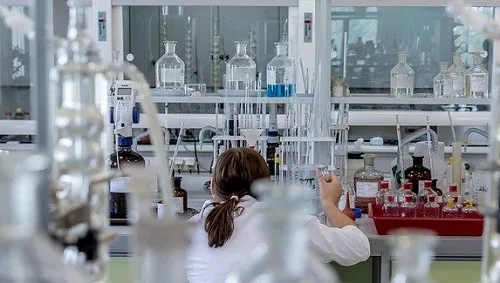Chemistry is the branch of science, that deals with the study of matter, its properties, compounds, composition, the structure of elements, and how and why substances combine or separate to form other substances. And the chemistry of fundamentals
Define Science: A systematized body of knowledge based on observation and experimentation is called science.
The main branches of chemistry are the following
1. Physical Chemistry
3. Inorganic Chemistry
4. Biochemistry
5. Industrial Chemistry
6. Nuclear Chemistry
7. Environmental Chemistry
8. Analytic Chemistry
What is Physical Chemistry?
The branch of chemistry deals with the relationship between the composition and physical properties of matter along with the changes in them.
Scope of Physical Chemistry;- 1. Structure of atoms. 2. Formation of molecules. 3. Behavior of gases, liquids, and solids. 4. Effect of temperature. 5. Effect of radiation on matter.
Organic Chemistry Basics
The study of Covalent compounds of carbon and hydrogen and their derivates.
Scope of Organic Chemistry: The scope of these branches covers petroleum petrochemical and pharmaceutical industries.
Inorganic Chemistry Definition
It deals with the study of all elements and their compounds except those of compounds of carbon and hydrogen and their derivates.
Inorganic chemistry examples
Scope of Inorganic chemistry:- It has applications in every aspect of the chemical industry such as glass, Cement, ceramics, leather, and metal-ling.
What is the study of biochemistry?
It is a branch of chemistry that deals with the study of the structure, composition, and chemical reactions of substances found in living organisms.
Scope:- it is applied in the fields of medicine, food science, and agriculture.
Short note on industrial chemistry
The branch of chemistry that deals with the study of manufacturing chemical compounds on a commercial scale is called industrial chemistry.
Scope of industrial chemistry:- It deals with the manufacture of basic chemicals such as Oxygen, Chlorine, Ammonia, Caustic Soda, and HCL Sulfuric Acid, These chemicals Provide raw materials for many other industries such as fertilizer, soap, agriculture, products, paints, textiles, and paper.
Nuclear chemistry definition and examples.
The branch of chemistry deals with radioactivity, nuclear processes, and properties.
Scope:- It has vast applications in medical treatment, preservation of food, and generation of electric power through nuclear reactors.
Environmental Chemistry
The branch of chemistry deals with the components of the environment and the effect of human activities on the water.
Scope:- It is related to other sciences such as biology, ecology, soil, and water.
Also Read: Atomic Fraction, Volume Fraction and Pressure Fraction Definition and Formula
Analytic Chemistry
The branch of chemistry that deals with the separation and environment of a sample to identify its components and separate is carried out.
Qualitative analysis: It provides the identity of a substance. It determines the amount of each component present in a sample.
Define Matter in Chemistry
Anything that has mass and occupies space is called matter e.g. our body, table, chair, salt, sugar, iron, plastic, etc.
Define Substance
A piece of matter in pure form is called a substance e.g. Gold, Water, Sugar, Sodium Chloride, Copper, Iron, etc.
What Is mixture in chemistry?
An impure matter is called a mixture e.g. Petrol, Air, Milk, Solid paper, etc.
Physical Properties
The properties that are associated with the physical state of a substance are called physical properties. For Example:- Color, Smell, taste, and Solubility.
Chemical Properties
The Chemical portieres depend upon the composition of the substance. When a substance undergoes a change, its composition changes, and new substances are formed. For Exam.: Rusting of iron, burning of coal, decomposition of water by passing electric current.
The Difference Between Metals and Nonmetals
>Valence bond theory and Molecular orbital theory
Chemical Properties
Metals:- Usually have 1-3 electrons in their outer shell. Lose their valence electrons easily. From basic oxides. Are good reducing agents. Have lower electronegativities.
Nonmetals:- Usually have 4-8 electrons in their outer shell. Gain or share valence electrons easily. Acidic form oxides. Are good oxidizing agents. Have higher electronegativities.
Physical Properties
Metals:- Good electrical conductors and heat conductors. Malleable- can be beaten into thin sheets. The Ductile can be stretched into a wire. Possess metallic lustre. Opaque as thin sheets. Solid at room temp.
Nonmetals:- Poor Conductors of heat and electricity. Brittle-if a solid. Non-ductile. Do not possess metallic lustre. Transparent as thin sheets. Solid, liquid, or gases at room temp.
>Sampling and Sample Preparation for Analysis
>Sodium silicate testing procedure
>Determination of Specific Gravity and Calculate
>Introduction of Metallurgy and Types of Metallurgy Process
>Determination of Iron Content | Iron Content (Iodometric method)




